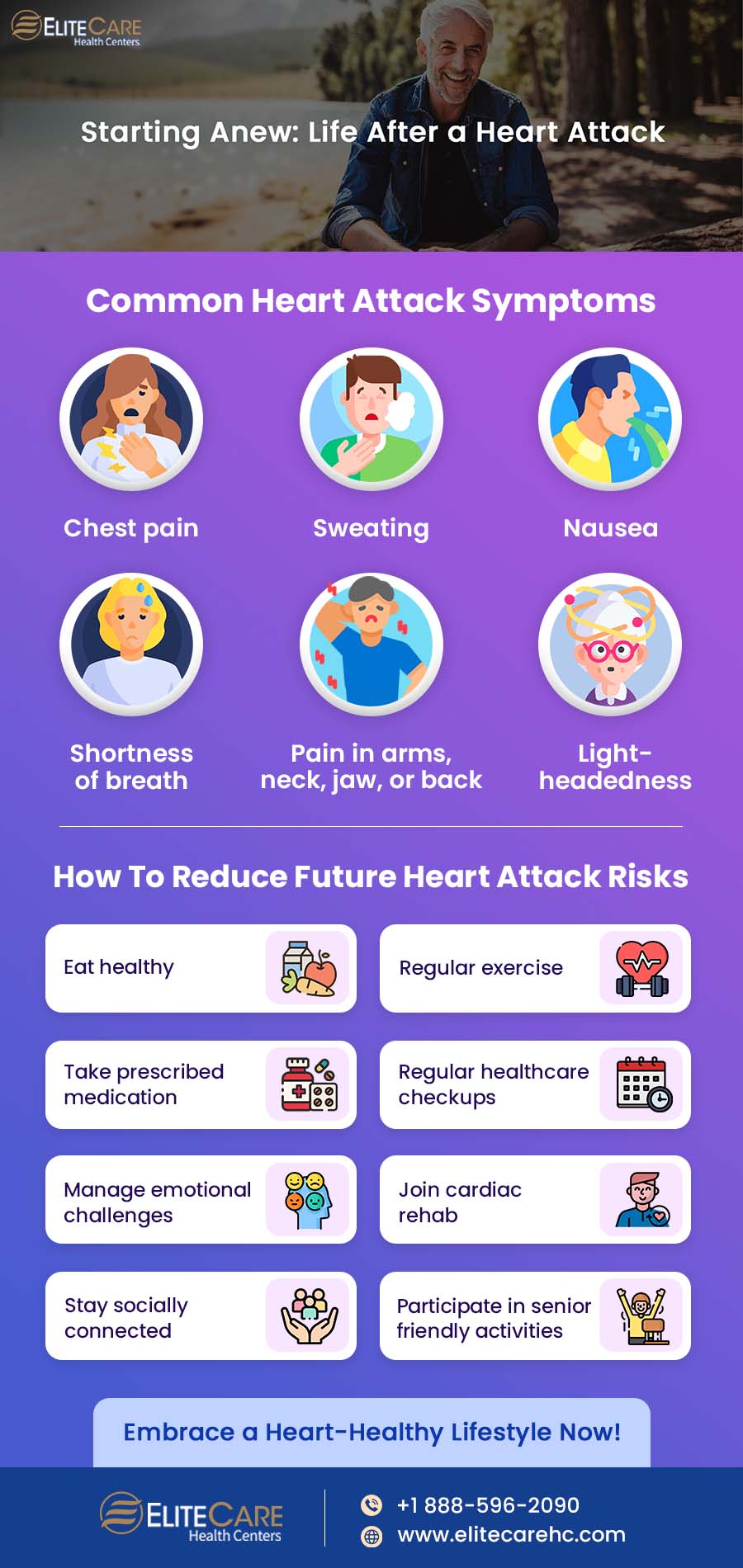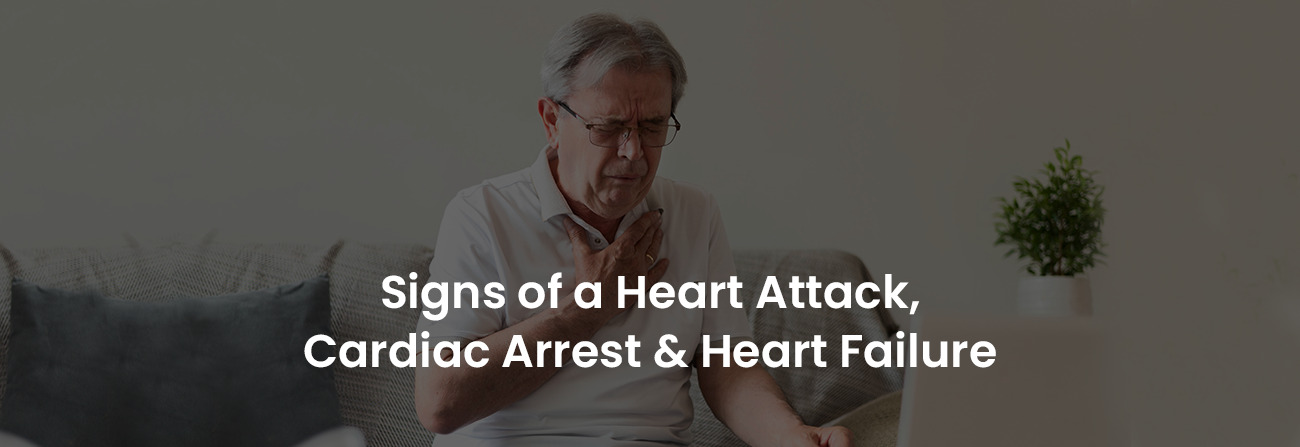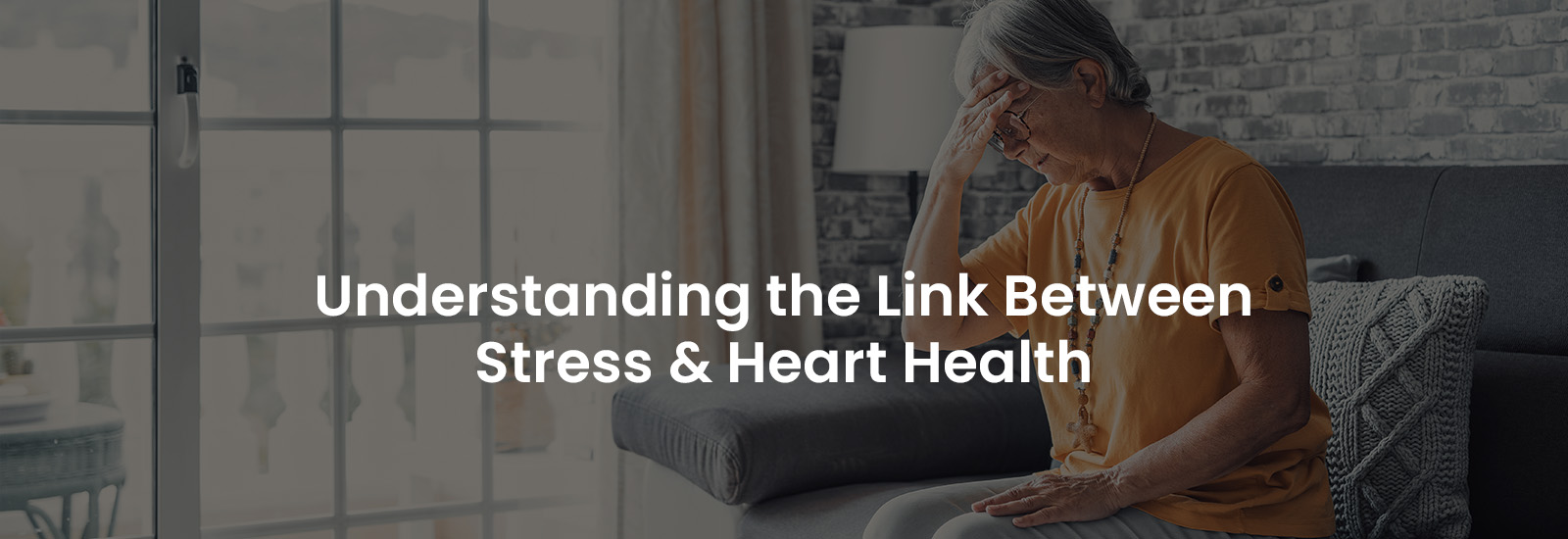
The heart muscle depends on an adequate supply of oxygen to function properly. A heart attack occurs when oxygen rich blood flow to the heart muscle is severely limited or completely cut off. This can be caused by a blockage in the blood flow carried by the arteries to the heart muscle, due to a buildup of fat, cholesterol, and other substances collectively known as plaque. The process of plaque buildup in the arteries is known as atherosclerosis. The plaque buildup in the arteries can rupture and form a blood clot, cutting off the blood supply to the heart muscle and causing cardiac ischemia. Damage or death of this heart muscle due to ischemic is termed a heart attack or myocardial infarction.
Symptoms
In its initial stages, atherosclerosis may not have any symptoms. However, when an artery becomes constricted by more than 70%, the affected tissue may experience muscle pain or cramps due to a lack of oxygen.
During a heart attack, an individual may encounter symptoms such as:
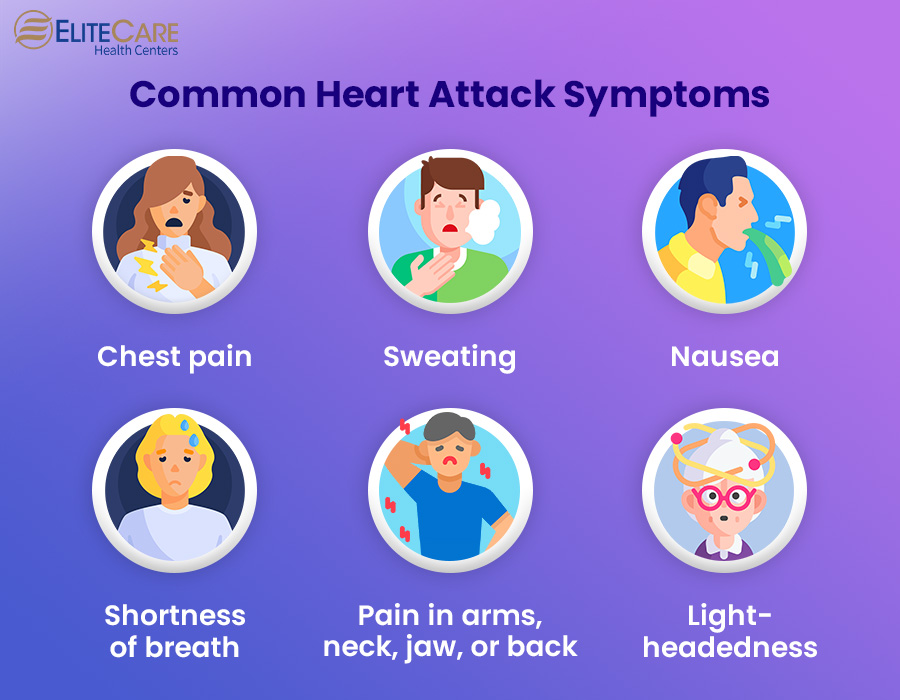
- Chest pain or discomfort
- Sweating
- Nausea
- Shortness of breath
- Discomfort in the arms, neck, jaw, or back
- Lightheadedness
If any of these symptoms occur, it is crucial to seek immediate medical attention.
Who Is at Risk of Heart Attack?
Factors such as high blood pressure, high cholesterol levels, smoking, obesity, a sedentary lifestyle, and family history increase a person’s chance of experiencing a heart attack. Adults aged 65 and older are more likely to suffer from some form of heart disease. This is because aging makes the blood vessels less flexible and more prone to damage and blockages. Additionally, seniors may have other health conditions, such as diabetes, which can increase their risk of heart disease and heart attack.
Diagnosis & Treatment
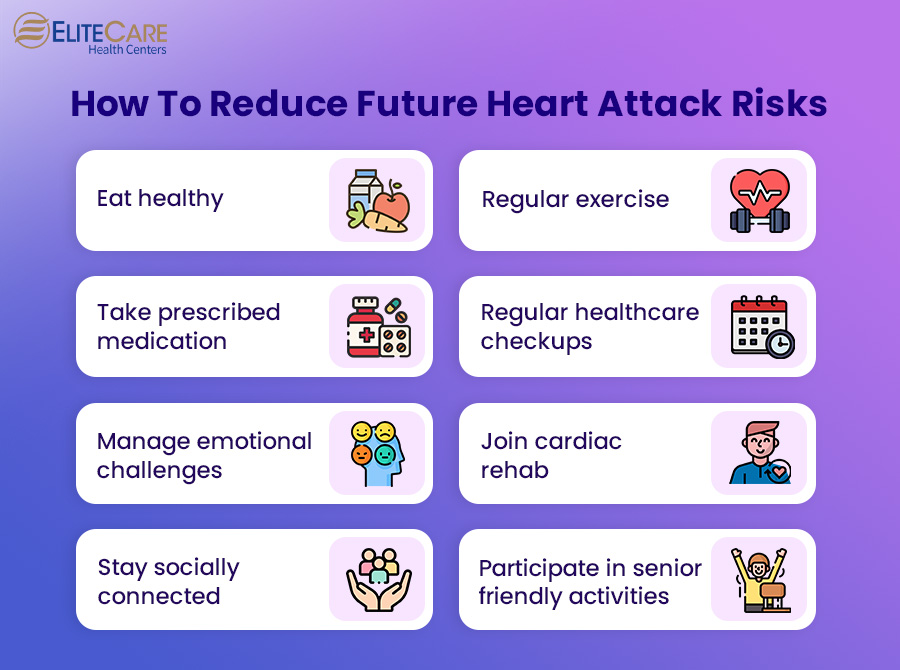
Heart attacks are often diagnosed in an emergency setting. Diagnosis may involve a physical exam, medical history review, and diagnostic tests such as an electrocardiogram (ECG), blood tests, and chest X-rays. These tests can help the physician determine if a person is having or has had a heart attack, the severity of the attack, and the damage levels to the heart.
To protect heart muscle immediate treatment is necessary for a heart attack. Every passing minute increases the risk of more heart tissue damage or death.
The treatment depends on the severity of the attack, but it generally involves medications. The prescribed medication helps to reduce the workload on the heart and prevents further damage. In more severe cases, procedures such as angioplasty and stenting or coronary artery bypass surgery may be necessary to restore normal blood flow to the heart.
For seniors, post-heart attack care may involve addressing other health conditions that may increase their risk for future heart attacks, such as high blood pressure, high cholesterol, and diabetes. Lifestyle changes such as regular exercise, healthy eating habits, and quitting smoking may also be recommended. However, with the right support and resources, and a bit of effort, seniors can successfully manage their health and live fulfilling lives after a heart attack.
Here are the following physical, mental, emotional, and social changes seniors should ideally undertake to reduce their risk of future heart attacks and live a better quality of life.
Physical Health
After a heart attack, seniors need to take care of their physical health to prevent further damage to the heart and reduce the risk of future heart attacks. Important factors to consider are as follows:
1. Have a healthy diet
- Consume a well-rounded diet consisting of various fruits, vegetables, whole grains, lean protein, and healthy fats.
- Limit sodium, saturated fat, and added sugars.
- Prioritize natural, whole foods and avoid processed foods.
- Consider developing a personalized nutritional plan with a registered dietician or senior care service provider.
2. Exercise recommendation
- Seniors should engage in physical activity for at least 30 minutes daily, five times a week.
- Walking, swimming, or cycling are excellent low-impact exercises for seniors.
- Strength training exercises can also improve bone health and muscle strength, but it’s best to consult a physician at the health care center and a trained fitness professional before starting any exercise program.
Read More: Can seniors do strength training exercises?
3. Medication management & follow-ups
- Seniors should follow their prescribed medications as directed by their healthcare provider.
- Regular follow-up appointments with primary care physicians are essential to monitor recovery and manage potential complications.
- Senior care services, such as home health care, can support and assist with medication management and follow-up appointments.
Working closely with a healthcare provider and seeking support from senior care services is crucial to ensure a successful recovery after a heart attack and stent placement.
Emotional Health
Recovering from a heart attack and stent placement can also affect a person’s emotional health. The common emotional challenges seniors may experience after a heart attack and strategies for managing them are as follows:
1. Emotional challenges
- Anxiety and worry about future heart health and complications.
- Depression and feelings of sadness or hopelessness.
- Difficulty adjusting to lifestyle changes.
- Changes in self-esteem or body image due to scarring, weight gain, or limitations in physical activity. These changes can be especially challenging for seniors who may already be struggling with age-related changes.
2. Ways to manage anxiety & depression
- Include relaxation techniques such as deep breathing exercises, meditation, or yoga
- For emotional support, maintain connections with friends and family.
- Engage in enjoyable activities and hobbies that can help stay occupied and achieve a sense of fulfillment.
- Contact a licensed mental health professional, such as a therapist or counselor, for professional help, if needed.
3. Benefits of support groups and therapy
- Cardiac rehabilitation or peer support groups can provide a sense of community and understanding among others who have experienced a heart attack.
- Cognitive behavioral and stress reduction therapy can provide a safe and supportive space to process emotions and develop coping strategies for managing anxiety and depression.
Seniors should not hesitate to seek assistance from their healthcare provider, medical clinic, or community resources for emotional support to improve their overall well-being and quality of life.
Social Health
Social connections and engagement in the community can provide emotional support and help reduce stress levels. This can positively impact seniors’ physical health during recovery after a heart attack and stent placement. Here are some strategies and resources for maintaining social health:
1. Maintain social connections and friendships
- Stay in touch with family and friends regularly through phone calls, video chats, or in-person visits.
- Join social groups or clubs based on shared interests.
- Participate in community events or activities.
2. Stay engaged in the community
- Find a new hobby or learn a new skill through classes or workshops.
- Attend local support groups or educational seminars related to heart health.
3. Resources for finding senior-friendly activities and events
- Check with Elite Care’s primary care physician or medical clinic for recommendations or referrals to community resources.
- Local senior centers or community centers often offer senior-friendly activities and events.
- Online resources, such as AARP, can help seniors find social groups or activities in their area.
By staying socially active and engaged, seniors can reduce feelings of loneliness and isolation, improve their mood, and enhance their overall quality of life after a heart attack or stent placement.
Summing it up
According to a study, 14.2% of adults aged 45 years and older have coronary heart disease (CHD), a stroke, or both. Seniors recovering from a heart attack and stent placement face various physical, emotional, and social challenges. They should prioritize their health and seek the resources and support needed during recovery.
At EliteCare Health Centers, we offer a range of senior care services that can be helpful for individuals recovering from a heart attack and stent placement. Our team of healthcare professionals is dedicated to providing personalized care and support to help seniors achieve optimal health and well-being.
One can recover from a heart attack and improve their overall quality of life with the right mindset, resources, and support.
